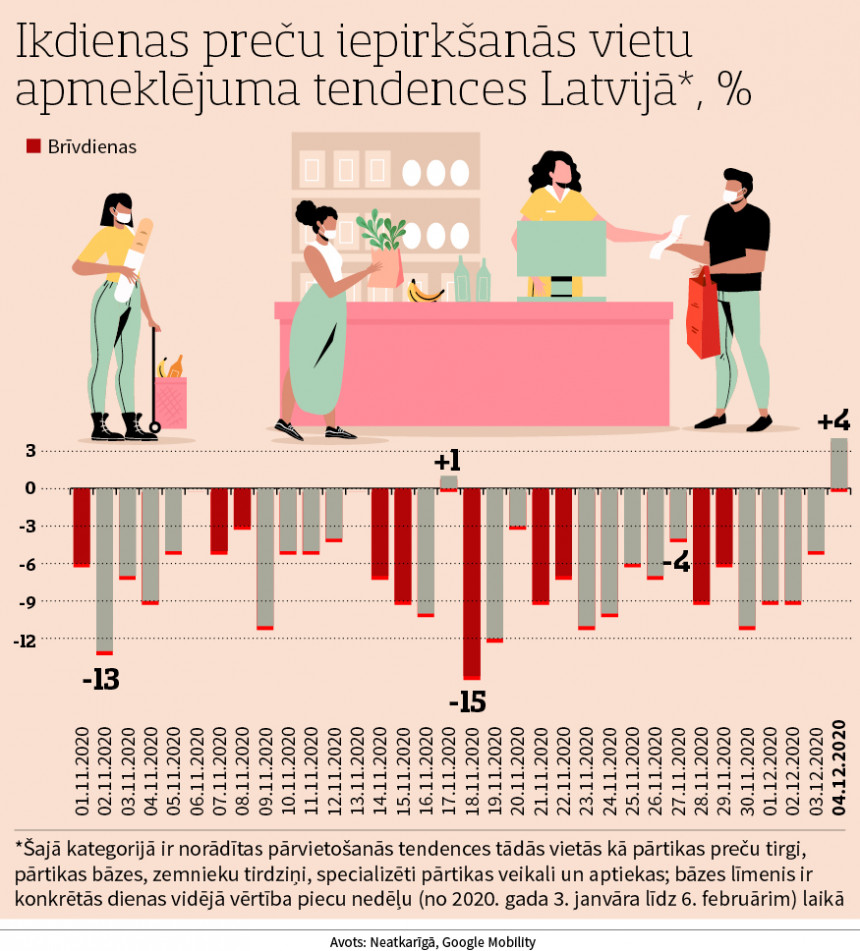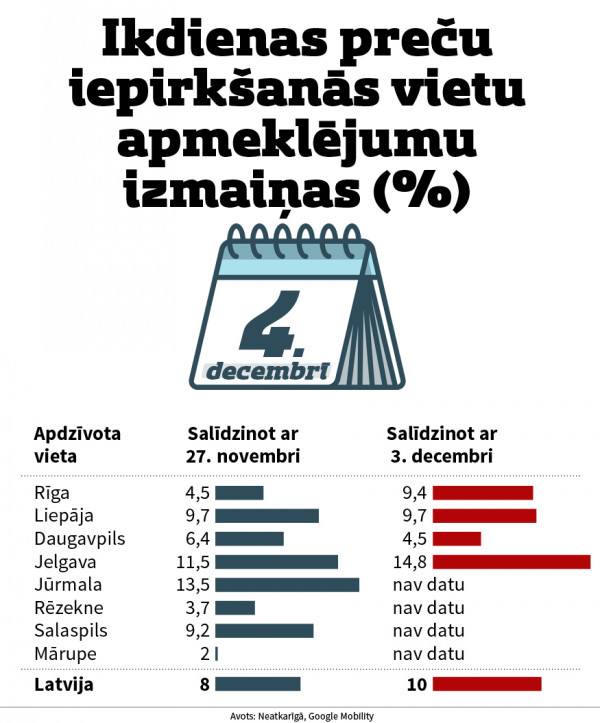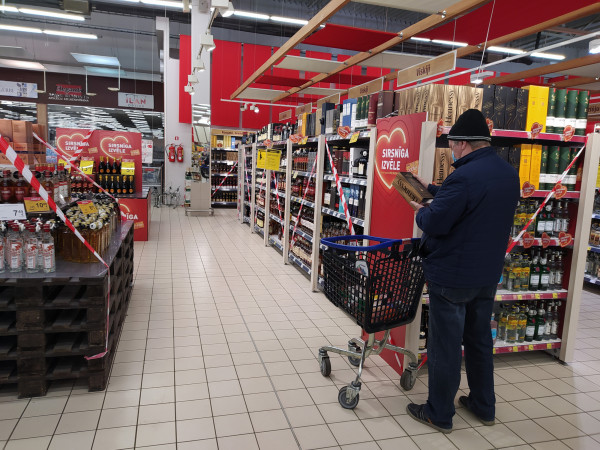On the pre-restriction Friday, shopping in stores was even crazier than before the crisis

Toys, garbage bags, batteries, shaving foam, as well as alcohol - these and other items banned from sale during the holidays were among the most purchased last Friday. There was more crowding in the shops than usual and queues formed at the checkout. Google mobility report shows that on this day, there were even more shoppers in both grocery and non-food stores than before the crisis, when there were no restrictions on gatherings and trade at all.
By using Google Maps on smart devices, the technology giant Google has been collecting data on population mobility in 132 countries around the world since February, measuring the extent to which societal behavior has changed in each of these countries.

These data show that on December 4, the food markets, wholesale food stores, farmers' markets, specialized grocery stores and pharmacies in Latvia were visited by about 4% more than in January and early February, i.e. at a time when the crisis had not yet reached Latvia.
Restaurants, cafes, shopping malls, amusement parks, museums, libraries and cinemas saw a 19% drop last Friday compared to pre-crisis levels, 36% fewer people on public transport and 28% fewer employees were at their workplaces than before the crisis.
Awaiting the pre-Christmas time with worry
Liene Dupate-Ugule, Head of Communications at Maxima Latvija, admitted to Neatkarīgā that as soon as the government's decision on the new rules to restrict the availability of certain goods on weekends came into force, Maxima stores had a larger number of customers than usual on weekdays. Industrial and household goods, toys, as well as alcoholic beverages and tobacco were bought more than usual.
"The drop in demand at Maxima stores over the holidays has been more than a third, with a significant impact on financial performance, but we are nonetheless ready to adjust, as the priority now is the safety of all employees and customers to stop the spread of the virus as soon as possible. It is gratifying that the first holidays under this ruling have been spent relatively peacefully, but there are some concerns about the holiday schedule, when there will be only three working days in the middle of eight holidays to buy the necessary goods on the limited products list. We invite people to buy the necessary goods in time, as well as to use the remote purchasing platform www.barbora.lv, where all Maxima product groups can be ordered and received also on holidays,” said L. Dupate-Ugule.
More people - bigger queues
In Rimi stores too the weekend restrictions contributed to a significant increase in the flow of customers on Friday - customers rushed to buy large weekly purchases (various food and non-food products) and especially those categories of goods that will be banned on holidays (non-food products, alcoholic beverages).

"In many places, it created queues. Security and shop staff had an additional burden to ensure that all security requirements were met. On the other hand, during the holidays, the flow of customers in stores was small in all Rimi format stores throughout Latvia. There was a great deal of confusion among consumers about what is and what is not a basic necessity, and on the ban on goods such as shaving products, garbage bags, baby bottles, prepaid phone cards, batteries, light bulbs and other household items, which are not included in the list of authorized products,” Regīna Ikala, Public Relations Manager of Rimi Latvia, shared her thoughts with Neatkarīgā.
Demand for cigarettes - doubled
The turnover of the national food retail chain Elvi last Friday, compared to Fridays a few weeks earlier, has increased by about 28 percent. "Buyers' interest in visiting stores has, of course, been stimulated by both shopping restrictions on holidays and proximity to Christmas, because more purchases than usual on Fridays were not only for the products that could not be bought at the weekend," Laila Vārtukapteine, Commercial Director of SIA Elvi Latvija told Neatkarīgā. Last Friday, for example, leisure and sports goods were bought by 57% more, household goods - by 23% more, toys - by 67% more, industrial goods - by 38% more, haberdashery - by 54%, alcoholic beverages - 49% more and cigarettes even 93% more than before. It also looks like shoppers are getting ready for Christmas, as demand for foods that can be bought beforehand and stored at home before serving on the holiday table increased significantly on Friday - for example, people bought +105% more grey peas, flour and flour mixtures - by +67 % more, canned mushrooms, pickles and other canned products for salads - by +39% more, sweets - by +28% more.
"Although the store staff worked in an increased mode and ensured all epidemiological safety standards, the sales data of the stores show that the ban on selling certain goods on holidays has ended with people still continuing to come to the stores, they are just more concentrated during the working days," concludes L. Vārtukapteine.
OPINION
Edgars Treibergs, Chairman of the Board of Latvian Agricultural Organization Cooperation Council (LAOCC):

- The time after the introduction of government restrictions has shown that there is now a massive crowding in supermarkets, markets and also at Christmas tree sellers on Fridays. The Latvian Traders Association has pointed out that on Friday, traders have served 20‒50% more customers, which has caused a crowding in shops and outlets. Current practice indicates that there is an urgent need to rethink and change restrictions in the run-up to Christmas to prevent crowds of people when shopping.
Christmas is a time when people try to please themselves, their loved ones, family, bring joy to them. Especially in these stressful times, everyone should be allowed to feel a sense of celebration, thus reducing tensions in society. I see no problem in allowing people to buy Christmas trees and home-made produce at fresh air markets. Now, by not being able to buy gifts and a Christmas tree for the holidays, which is one of the symbols of the Latvian holiday, the government and the Saeima are stealing Christmas and creating even more tension in society. This is unacceptable! It is also important that traders and home producers are deprived of the opportunity to earn most of the annual income that they normally earn at Christmas markets.